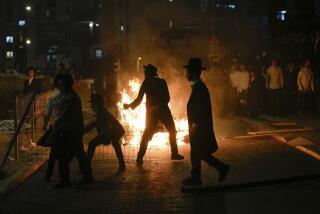Israel’s draft reform debate and the ‘people’s army’
- Share via
JERUSALEM — Israelis take pride in calling their military the “people’s army,” a unifying institution that helps smooth over religious differences and instills nationalist values.
But despite a long tradition of mandatory conscription, today only about half of all Israelis serve, largely because Arabs and the ultra-Orthodox Jews are exempt.
On Wednesday, government talks aimed at broadening the draft broke down amid staunch opposition from ultra-Orthodox groups. The negotiations follow an Israeli Supreme Court ruling that the exemption for ultra-Orthodox was unfair.
In an interview with The Times, sociologist and Open University of Israel associate professor Yagil Levy said the government should move cautiously on the draft, a reform effort that could upset the delicate balance between Israel’s secular and religious communities. Levy, an expert on the intersection of army and society, said at stake is the future of the Israel Defense Forces, the nation’s military.
Is the IDF really still a “people’s army?”
Yes, but that’s a symbolic term. The army was never so inclusionary that all parts of the Jewish population took part. But today we can say more groups than ever take part, even as the overall participation has dropped. The military is more representative of the mosaic of Israeli society because it includes more religious sectors, Mizrahi groups [descendants of Jewish communities elsewhere in the Middle East, North Africa and the Caucasus], Druze and women.
But major groups like Arabs and the ultra-Orthodox don’t participate, and a growing number of liberal, secular and middle-class are avoiding service.
Arabs and the ultra-Orthodox never participated, so that’s not new. But it’s true the drop in secular middle class, both in participation in the draft and their share of combat roles, is the biggest demographic change the military has undergone during the past 10-15 years.
Is drafting Arabs and ultra-Orthodox the solution to making the IDF more of a “people’s army?”
No. I don’t think the military or state should coerce these groups. Besides, most of the current proposals don’t talk about drafting them into military service but recruiting them for some kind of national civil service. Only a few ultra-Orthodox would be designated into the military, and even then, they’d serve in special units. So in military terms, it won’t change things.
Isn’t universal service still important to binding Israelis together?
The idea of the military as melting pot is a big bluff. This is not the 1940s or ‘50s, when the military was the only framework in which new immigrants could meet. Today’s society has a large degree of mobility. Lack of military service has nothing to do with the separation of Arabs and ultra-Orthodox. They live in separate communities, have different education systems. The military is not the place to create an artificial encounter between them.
So what’s this debate about?
The idea is to legitimize — or re-legitimize — mandatory military service by asking that the burden be shared more equally. It’s not that we need these people in the military, but we need to legitimize the drafting of other people. So the goal is not to save the “people’s army” but to save the idea of the draft. If the government fails to enact a more egalitarian service, the future of the draft is in question and could be abolished in the next 10-15 years.
Would that be so bad? Why not move to a professional, volunteer army like the U.S.?
Right now, the military says no. They say we still need a large number of soldiers because of the regional challenges.
Not enough young Israelis would volunteer?
No, and the better-educated people would prefer to develop their careers. The cost to attract people [and pay competitive salaries] is beyond the military’s capacity. We’d be talking about a dramatically smaller army and the IDF position is that they can’t live with that.
Does that say something about the patriotism of younger Israelis?
There’s no debate about the fact that young Israelis are less patriotic than they were in the past. The phenomenon of secular upper-middle class opting out of service and combat roles is a clear indication of that.
Wouldn’t even a smaller, professional volunteer force be stronger and more efficient than a large one that includes people who don’t want to be there?
The IDF doesn’t think so. They are worried about the ability to preserve their missions and worry market-force economic pressures might force the state to pursue fewer missions. It might pressure them to withdraw from Golan Heights, the West Bank or not to guard the settlements and use more contractors to breach the gap.
But the voluntary model is dangerous for a second reason. There would be less engagement and interest from the middle class, a group that has played an important role in the past in pulling back the military, from places like Lebanon [through public protests by families of soldiers]. When there is no draft, the government has a broader space to deploy the military. We saw that in the U.S. with Iraq. In Germany, after they suspended the draft, there were fewer objections to peacekeeping missions. Without a draft there is less intervention and influence from the public, but that is still important for Israel.
More to Read
Sign up for Essential California
The most important California stories and recommendations in your inbox every morning.
You may occasionally receive promotional content from the Los Angeles Times.










